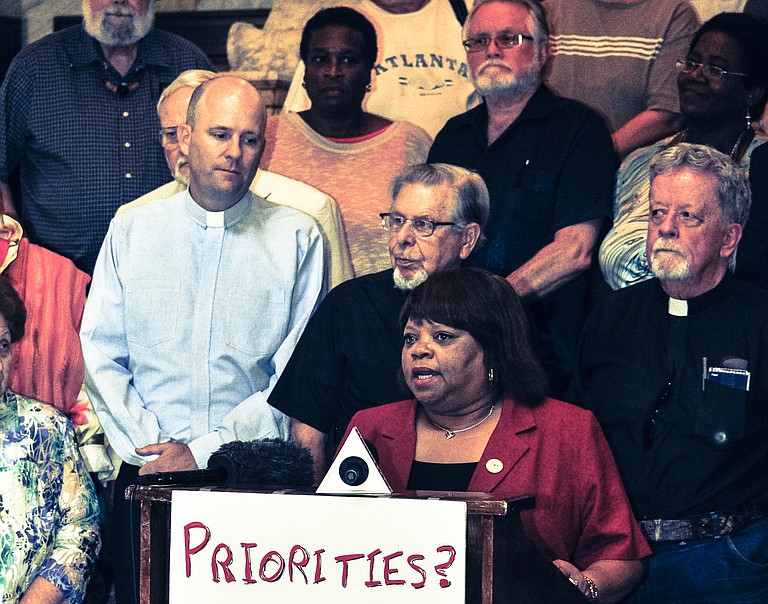Brenda Scott, president of the Mississippi Alliance of State Employees, a labor organization, questioned whether state politicians are really doing God's work in Mississippi. Photo by Trip Burns.
Friday, August 22, 2014
From the rolling back of abortion rights to extolling the virtues of teen abstinence and one-man-one-woman marriage to protecting religious freedom, Mississippi's elected leaders say they are all about spreading the word of Jesus Christ.
Organizers and supporters of what they're calling a Moral Movement are dubious of those claims. The evidence, they say, lies in legislative actions Mississippi has taken in the past few years.
"We're putting God on the (state) seal, but are we really doing his work here?" Brenda Scott, president of the Mississippi Alliance of State Employees, a labor organization, told the Jackson Free Press.
Scott is referring to a law the Legislature passed earlier this year that went into effect July 1. Called the Religious Freedom Restoration Act, it added the phrase "In God We Trust" to the official state seal and ostensibly strengthened protections on religious expression. The latter provision sparked controversy because social-justice activists believed the law would open the door to discrimination against minorities.
The act also prompted the nation's LGBT advocacy organization, the Human Rights Campaign, to launch a new initiative across the South called Project One America. HRC named former Mississippi United Methodist pastor Rob Hill as its executive director. Denise Dennell, also a former pastor of Mississippi United Methodist church, will serve as HRC's Mississippi faith leader, and the group will hire a field organizer.
Several cities around the state, including Jackson, have passed equality resolutions. Hill said this morning that HRC would like to meet with Mayor Tony Yarber and the city council about adopting a city ordinance that protects sexual orientation and gender identity.
Thirteen southern states are joining North Carolina in participating in a Moral Week of Action, each day focusing on a legislative area where opportunities exist for more moral policymaking. Those areas include economic justice and labor rights, education, juvenile justice, women's rights, Medicaid expansion and "respect in the Law and in the Community regardless of race, creed, class, gender, sexual orientation and immigration status."
Gov. Phil Bryant, who considers himself a devout Christian, wrote a July 18, 2014, letter to President Obama expressing outrage at the U.S.'s growing trend of taking in and helping immigrant children. It began: "I am writing to express my deep concern regarding the ongoing crisis at the United States' southern border. Illegal aliens—many unaccompanied children—are flooding into our country in record numbers."
Father Jerry Tobin said there is a moral imperative to protect children. "Stuff like this is horrible," Tobin said of comments like Gov. Bryant's.
The Rev. Bruce Case said we should remember people "languishing under the crushing burden of poverty" when making policy.
"If it is not good news for the poor, it is not good news," Case said.
The Moral Movement group plans a rally for Thursday, Aug. 28, at the Capitol.


Comments
blackwatch 9 years, 8 months ago
Interesting question, I have been debating this for years at my church. This issue of "Following Christ" in politics is just too rife with subjectivity to make a definitive stance on it. For every progressive Christian that talks about the need to address and care for the poor and oppressed, there are more conservative believers that will argue that the government shouldn't take tax dollars to do this, but allow for private entities and the church to be the sole providers for the poor and oppressed. Who's right? How do we know? It is not like the Bible was written at a time where there was an advanced global economy developed with exploitable markets and such. So, there is no direct answer in the scriptures. Besides, we all approach faith from our individual subjectivity. Our own experiences, stations in society, levels of literacy, etc. all shade how we would approach this issue. I'd just say that as a Christian, note that the faith speaks to heart and mind, and that our faith should be strengthened as we learn more of each other and of the nature of life. Therefore, we should develop values, live by them, and advocate for our perspectives in the public square. If privately, we fully believe our perspectives line up with what God would have for us to do, then so be it. But publicly, our faith wouldn't justify much in terms of our politics. We should point more towards the pragmatic ends of our political perspectives. Does it make practical sense to turn our backs on children ?
forrest 9 years, 8 months ago
The easy answer to the headline is this "kind of." When it suits them, yes, politicians follow Christ's example. We all do. When it suits us, we follow the 10 commandments and love one another. But when it's not in our percieved best interest, no, we don't.
I'm great at loving people who come into my church. I hand money and water to homeless people and have given many of them rides to shelters or picked them up to take to wherever they are going. It's in my best interest because it makes me feel good about myself and the work I'm doing to help others. At other times I lock my doors and roll up my windows when I see people who look shady. Who wouldn't protect themselves from people who actively act like they are criminals looking for victims? Christ would have me love them as well and I fail daily at that...
Allowing unlimited numbers of children to enter our country sounds like the Christian thing to do, but I'd say that it's anything but that. Christ never took the shortcut to loving people and, instead, found the root of their problems and healed those things first.
Would those children who come here be better served if we accepted them here, took on massive extra levels of debt to care for them, and placed them into foster systems that are already overburdened; or would they be better served by fixing the problems in their home countries so that they could remain and prosper with families that love them?
Before we can fix those problems, we have to understand them. The war in Mexico and Central America over drugs and money that have crippled their economies, killed their fathers, and decimated legitimate governments have caused this problem; and that is a war that we (unintentionally) started with the "war on drugs" whick has, by all accounts, ruined more lives than the actual drugs we are at war against.
Allowing our neighbors to suffer because of our policies is NOT what I believe Christ taught us to do. And while Paul spoke out against drunkenness, I don't believe he would have wanted tens of thousands to die over a black market created by outlawing alcohol.
That same love saddens me when I hear politicians speak against marriage equality. How can a Christian claim to love someone as they love themselves, but deny them the same rights they enjoy. No, I don't believe that homosexuality is right or natural, but neither are my many, many sins. The only one served by making LGBT citizens feel like second class citizens is Satan himself who loves division and hatred.
Simply put, yeah, we all follow Christ when it's something we like doing. But I don't think that's good enough. We should be following His lead when it's against our own self interests as well; and I'm just as horrible at that as the men and women who pass laws in this state.
Sign in to comment
Or login with:
OpenID